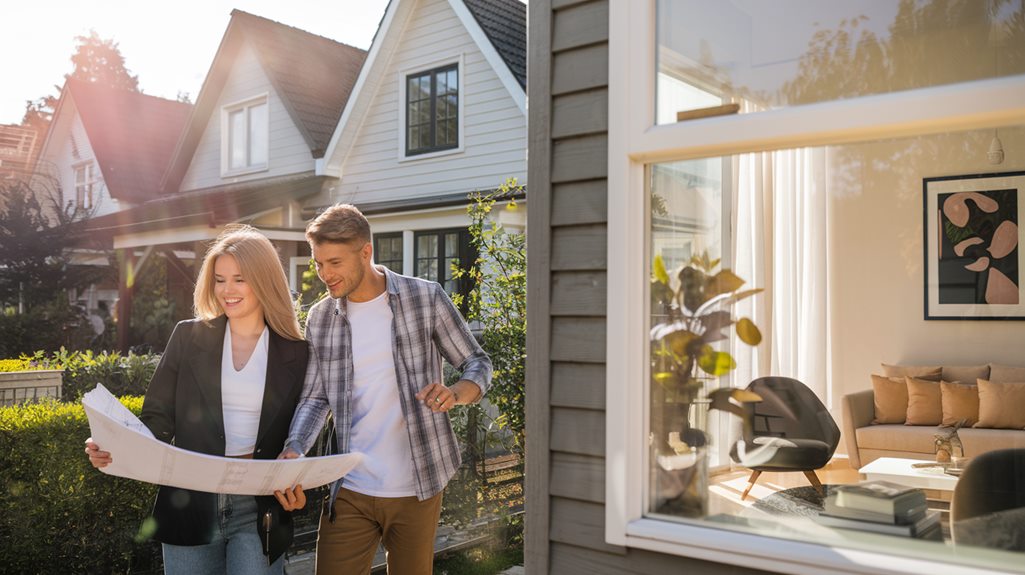If you want to buy your first home, start by checking your money situation. Look at your credit score, pay off some debts, and make a budget that includes taxes and costs for repairs.
Get a mortgage pre-approval. This helps you know how much you can spend on a house.
Think about what you need in a home and look at different neighborhoods to find good places with nice things and safety.
Start looking for houses with your budget in mind and get help from a trusted real estate agent.
When you find a house you like, make an offer and add some earnest money to show you're serious.
Always have a home inspection to check for problems.
Before you finish the deal, read all the closing papers and walk through the house one last time.
With these steps, you will feel ready and excited to be a homeowner!
Ready to start building equity in your own Michigan home? Get your personalized home loan quote today.
Assess Your Financial Health

Checking how you handle money is super important when you want to buy a home. First, look at your credit score. It helps lenders decide if they'll give you a loan and how much interest you'll pay.
Next, try to pay off any debts that have high interest. This will help you save money in the long run.
It's also a good idea to save money for your new home. Put aside some cash just for that!
Think about ways to make your money grow, too. You want to get the most out of what you have. Use a budget to keep an eye on your spending. This helps you see where you can save more.
Keep track of what you buy each month. This way, you can find out where you might be spending too much and cut back.
Think about finding new ways to make money, too. This can make you feel safer with your finances.
You might be closer to buying your home than you think
Take our 2-minute home buyer readiness quiz to see how prepared you really are – no credit check required.

Michigan residents, unlock the door to your new home. Request your home loan quote from Treeside Financial today.
Establish a Realistic Budget
To make a good budget for buying a home, start by looking at how much money you earn each month.
Figure out how much you can spend on your house without feeling stressed.
Don't forget to think about other costs like property taxes, insurance, and repairs. These can add up and change your budget.
It's also important to think about your other goals in life. This way, you can enjoy your new home and still save for the things that matter to you.
Analyze Monthly Income
Before you jump into buying a home, it's really important to take a good look at how much money you make each month. First, write down all the money you get from different places, like your job, any side jobs, or money that comes in without you working for it. This will help you see how much you can actually spend on a home.
Next, think about how you save money. Do you put some of your money away each month? If not, try to start saving a little bit regularly. You can even set it up so your savings happen automatically. This way, you don't have to think about it!
It's not just about the numbers. It's about feeling good and safe, knowing you're ready for this big step.
Looking at your income is the first step to making your dream of having a home come true!
Estimate Additional Costs
Now that you've looked at how much money you make each month, it's time to think about the extra costs of buying a home. These extra costs can surprise you, so it's important to plan for them.
First, think about closing costs. These can be a lot of money! Also, don't forget about moving costs. Many people forget to add these in, and they can add up fast.
You will also need to pay for home insurance and property taxes every year. These are important, so plan for them.
Maintenance fees and utility bills can sneak up on you too. Make sure to save some money for these.
If you want to fix up your new home, set aside some cash for renovations. Also, keep some money for home inspections. This will help you avoid big problems later on.
- Hidden Costs: Remember to plan for property taxes and home insurance.
- Surprise Fees: Don't forget about maintenance and utility costs.
- Be Ready: Make a budget for renovations and inspections.
Prioritize Financial Goals
Making a good budget is important if you want to buy a home and feel secure with your money. Start by thinking about what's most important to you. Do you want to pay off some debts or save more money for a big down payment? By figuring out what matters most, you can set good goals.
Next, look at how much money you make each month and how much you spend. Make a budget that fits your life but still leaves some space for surprise costs. This careful planning helps you feel more in control as you go through the home buying process.
Secure Mortgage Pre-Approval

Getting a mortgage pre-approval is an important step when you want to buy a home. It shows sellers that you're serious and ready to buy. It also helps you know how much money you can spend, which can make buying a house faster and easier.
First, learn about different kinds of mortgages. There are fixed-rate mortgages, adjustable-rate mortgages, and government-backed options. Each one is different, so pick the one that works best for you.
Next, look at different lenders. This means checking who can give you the best deal. Don't just take the first offer you see. It's smart to shop around to find the best rates.
- Learn about mortgage types to find one that fits your needs.
- Look at different lenders to find good rates.
- Get pre-approved to make your offer stronger and help you stand out.
Identify Your Housing Needs
Finding the right home is really important. It helps you live happily in a place that fits your life.
First, think about where you want to live. Is the neighborhood nice? Does it feel good to you?
Next, make a list of things you really want in a home. Do you need a certain number of bedrooms? Do you want a yard to play in?
Also, think about how close the school, parks, and stores are. These things can make your everyday life easier and can help if you ever want to sell your home later.
It's also important to think about what you might need in the future. Will the neighborhood still be good for you as time goes on?
Research Neighborhoods

As you think about where to live, it's important to learn about different neighborhoods. Take some time to look at what each neighborhood has to offer. Check out parks where you can play and relax. Look for schools to make sure kids can get a good education. Safety is key, so look at crime rates to see how safe the area is.
Also, think about how easy it's to get around. Are there buses or trains nearby? You want to be able to travel without trouble. Look at who lives in the neighborhood too. You want to find a place where you feel like you belong.
Don't forget to visit the neighborhoods at different times of the day to see what they're like. Talk to people who live there and ask them what they think. You can also look at online forums for more information.
Doing this research will help you find a neighborhood that feels just right for you.
Find a Reliable Real Estate Agent
Finding the right real estate agent can make a big difference when you're buying a home. It's important to pick someone who knows a lot about real estate. Look for agents who've good experience, special certificates, and are part of professional groups. This means they keep up with the latest information and follow the rules.
Good communication is super important too. You want an agent who talks to you, listens to what you need, and tells you what's happening throughout the process. When they do this, it builds trust and makes everything easier.
Don't be shy about asking agents questions. Find out about their past work, how many homes they've helped buy or sell, and how they'll help you.
Start House Hunting

When you start looking for a house, the first thing to do is set a budget. This helps you choose homes that you can afford and keeps you from spending too much.
Next, check out different neighborhoods. Think about things like schools, parks, and how far it's to work or school. This will help you find a place that feels right for you.
Finally, make plans with your real estate agent to visit the houses you like. This way, you can see if they match what you want and need.
Happy house hunting!
Define Your Budget
Buying a home is a big step, and it's important to know how much money you can spend. This helps you feel good and ready when you start looking for a house.
First, think about what kind of mortgage works best for you. A mortgage is a loan to help you buy a home. The amount of money you put down at first, called a down payment, is also very important.
Here are some easy steps to help you get started:
- Look at your money: Check how much you spend each month and how much you can save.
- Learn about mortgages: There are different kinds, like fixed-rate and adjustable-rate. Each has its own good and bad sides.
- Think about your down payment: If you can, try to save at least 20% of the home price. This way, you won't have to pay extra costs like private mortgage insurance (PMI).
Explore Neighborhood Options
Now that you know how much money you can spend and what kind of mortgage you want, it's time to think about where you want to live.
Look for neighborhoods that have fun parks, cool shops, and places to play. If schools are important to you, check out the local ones.
It's also good to think about how you'll get to work or school; a quick drive or bus ride can make your day better. Safety matters too, so look at crime rates in the area.
Find out how much houses cost and if they might go up in value later. Also, learn about the people who live there to see if you'd fit in.
All these things help you find a neighborhood that feels like home.
Schedule Property Viewings
Looking for a new home can be really exciting! You get to explore different houses and find one that feels just right for you. Make sure to pick homes that have the things you want, like a big kitchen or a nice backyard.
When you go to see the houses, it's important to be on time, be nice, and pay attention to what you see. This helps you make a good impression on the sellers and dream about living there.
Here are some tips to make house hunting even better:
- Make a list of things you really want in a home and other things that would be nice to have.
- Take notes and pictures while you visit each house so you can remember them later.
- Ask questions about the neighborhood and what the area is like. This will help you decide if it's the right place for you.
Happy house hunting!
Make an Offer
When you find a home you really like, it's time to make an offer that catches the seller's attention. First, learn about the local market and what other similar homes have sold for. Offer a fair price that shows you know what the home is worth, but also leave some room to talk about it if needed.
Sellers like to see that you're serious, so you might want to include some earnest money. This shows you're committed to buying the home.
Think about what the seller might want. If you can be flexible on when to close the sale or if you don't mind skipping some small things in the deal, these can make your offer more appealing.
Talk with your real estate agent to help make your offer fit what the seller is looking for. Doing this can help you get the home you want!
Conduct a Home Inspection

When you look at a house, it's really important to check for any problems that could make it worth less money or not feel good to live in.
First, make sure the house is strong and can handle bad weather and time.
Then, look for any safety issues that could be dangerous for you or your family.
This way, you can feel safe and happy about your new home.
Identify Potential Issues
Buying a home is exciting, but it's also a big decision. One important step is to have a home inspection. This helps you find any problems that could cost you money later. You want to make sure your new home is a good choice!
Here are some things to look for:
- Hidden Problems: Check for water leaks, bad wiring, or mold that you can't see right away.
- Legal Rules: Make sure you understand the local laws so you don't get into trouble later.
- Safety in the Neighborhood: Look at crime rates and see if there are parks or stores nearby.
Evaluate Structural Integrity
When you're thinking about buying a new home, it's really important to check if it's strong and safe. This is done by having someone look at the house carefully, which is called a home inspection. You want to make sure the foundation is strong and the building materials are good. Hiring a good inspector can help you feel safe and part of a friendly neighborhood. They will check important parts of the house like the roof, walls, and floors.
| Inspection Area | Why It Matters |
|---|---|
| Foundation | Keeps the house steady |
| Roof | Shields from bad weather |
| Walls | Keeps everything strong |
| Flooring | Shows how well the house is made |
Assess Safety Concerns
After you check if your new home is strong and safe, the next important thing to do is look for any safety problems. This means more than just checking pipes and wires. It's about making sure your family is safe.
You should also think about how safe the neighborhood is and look at crime numbers. A safe place to live helps everyone feel like they belong.
It's a good idea to hire a professional inspector who can find problems you mightn't see. This will help you feel better about your choice.
Here are some important things to remember:
- Neighborhood Safety: Look up crime rates and talk to people who live there to learn more about the area.
- Home Security: Make sure doors and windows are strong and locks work well.
- Environmental Hazards: Check for things like mold, asbestos, or radon that can be harmful.
Doing these things will help make sure your new home is a safe and happy place for your family.
Close the Purchase
You're almost there! Closing the purchase of your new home is an exciting step. First, you'll need to look over some important papers and sign them to make sure everything is right. Then, take a final walk through the house to check that everything is in good shape.
It's also smart to get title insurance to keep your investment safe. Don't forget to understand the costs you'll need to pay at closing so there are no surprises.
Learn a bit about how the escrow process works and what the timeline looks like so everything goes smoothly. If any last-minute worries come up, think about how you can work things out.
Here's a simple chart to help you remember what to do:
| Task | Purpose | Who does it |
|---|---|---|
| Review papers | Make sure everything is correct | You |
| Final walk through | Check the house's condition | You |
| Get title insurance | Protect your investment | You |
| Understand costs | Know what you need to pay | You |
| Learn about escrow | Help the buying process go well | You/ Seller/Agent |








